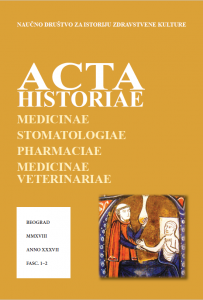FRANCIS GALTON’S EUGENICS: RETHINKING THE DEVELOPMENT OF A SCIENTIFIC DOCTRINE
FRANCIS GALTON’S EUGENICS: RETHINKING THE DEVELOPMENT OF A SCIENTIFIC DOCTRINE
Author(s): David RedvaldsenSubject(s): Political Philosophy, Sociology of Politics
Published by: Naučno društvo za istoriju zdravstvene kulture
Keywords: Eugenics; sociological theory Non MeSH: Francis Galton; Karl Pearson; Charisma; Britain
Summary/Abstract: A number of articles and books published since 1979 have successfully shown that eugenics in Britain was compatible with various political views, including progressive ones. Th is contribution to the debate, however, argues that eugenics as originated by the scientist and explorer Francis Galton in 1865 was intended as an ameliorative doctrine of creating better human beings and a better society. It was based on Charles Darwin’s theory of evolution and Galton’s own studies of heredity. Both men believed that societies generally advance towards greater benevolence and altruism. Galton additionally thought that this process could be speeded up through selective breeding. He assumed most improvements in civilization were the result of superior minds. Moreover, eugenics could replace natural and sexual selection, which often had cruel consequences for the least “fi t” members of a species. Eugenics, as Galton conceived it, was therefore an alternative to social Darwinism, not a synonym for it. In the fi rst decade of the twentieth century, towards the end of his life, Galton began institutionalizing eugenics. Th is article analyzes these eff orts through the use of Max Weber’s theory called “charisma and its transformation.” What became the Galton Laboratory at University College London was clearly meant as a continuation of Galton’s work on eugenics. It was led by his chosen successor Karl Pearson. Galton’s public lectures on race improvement, however, also inspired the founding of a Eugenics Education Society in 1907. Th is society had no initial connection with Galton and Pearson disapproved of it. Member contributions to the Eugenics Education Society’s journal and other media outlets turned the doctrine into a variant of social Darwinism. Because the Eugenics Education Society was better at propagating its message than the Galton Laboratory, eugenics gained a reactionary reputation. By reconstituting Galton’s original eugenics, we understand better why it also appealed to progressives.
Journal: Acta historiae medicinae, stomatologiae, pharmaciae, medicinae veterinariae
- Issue Year: 2018
- Issue No: 37
- Page Range: 54-70
- Page Count: 17
- Language: English

